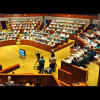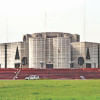Vertical democracy: Why Bangladesh needs a second chamber

As the nation grapples with complex challenges—from economic equity to climate resilience—the limitations of a unicameral parliament are becoming increasingly apparent. A second chamber is not about importing foreign templates. It is about crafting a Bangladeshi solution for deeper representation, effective legislation, and inclusive nation-building.
This cannot be a mimicry of Westminster or Washington, but must be a deliberate effort to democratise the polity. Yet constitutional change must not be abrupt. History teaches that sudden, sweeping reforms, detached from lived institutions, have a pronounced tendency to destabilise—such as Nepal's turbulent, decade-long transition to federalism, which commenced in 2008. The pathway for Bangladesh, therefore, must be cautious, the steps meticulously deliberate—an evolution firmly grounded in the nation's distinct social fabric and historical journey.
Constitutional architecture, like deltaic landforms, requires patient sedimentation. Bangladesh suffers from institutional anaemia, not mere design flaws. Despite having constitutional provisions for local government, it commands only around five percent of national expenditure, and the state remains lopsided. Forging an upper house atop this hollow base risks consolidating a Dhaka-centric oligarchy. True reform must aim for devolution rather than centralisation, redistributing power downward before horizontally.
Before erecting an upper chamber, the priority must be establishing local self-government at the grassroots, not merely extending the presence of the central state. This, among other reforms, may require amendments to Articles 59-60 to vest upazila parishads with genuine fiscal and legislative authority over core public goods—beginning with primary healthcare and education. Such enhancements echo India's post-73rd Amendment reforms in 1992 or Indonesia's devolution after 2001. The reform for devolution, not decentralisation in its truest sense, is not transplantation—it is constitutional composting: meticulously fertilising the soil before planting the tree.
Reform must commence not with dismantlement, but with robust fortification. The unicameral Jatiya Sangsad must be strengthened to enable deeper scrutiny and enhance public accountability. Empowering parliamentary standing committees, for example, with independent research units, significantly improved staffing, and specialised legal expertise, could substantially enhance their capacity to dissect bills and monitor government action effectively—akin to Germany's Bundestag Scientific Service, expanded after 1949, or the longstanding Congressional Research Service in the US.
A formal advisory "Council of Experts" could also be established to offer informed and invaluable input before bills formally reach the parliamentary floor, drawing inspiration from France's Conseil d'État—a model institutionalised by Napoleon in 1799 to ensure legal consistency in policymaking.
Enhanced citizen consultation must unequivocally accompany this. Mandating robust public hearings and structured feedback mechanisms on significant bills would undoubtedly foster broader public buy-in and help uncover critical blind spots—practices now common in many countries.
A gradual approach could be undertaken, laying the groundwork to establish a full-fledged second chamber. There could be a transitional upper house, its composition—blending experts and other members—determined by both MPs and local governments. This chamber would initiate debates and offer reasoned objections without wielding veto power.
Contingent on the success of the advisory stage, it could be granted limited powers through referendum, following Ireland's 1937 precedent. These powers might include a suspensive veto (e.g., delaying legislation for 6-12 months), mirroring France's Sénat under the 1958 constitution, while a qualified veto would require a supermajority in the upper house.
Alternatively, concurrent legislative authority might be conferred in specific areas such as cultural heritage, environmental stewardship, or inter-regional development—domains often overlooked in majoritarian politics. Compositional refinements could be gradually introduced to enhance legitimacy.
The final phase would establish a mature bicameral parliament. Delineating the roles of each house—where the lower house retains primacy in financial matters and government formation due to its direct popular mandate, and the upper house focuses on legislative review—is crucial to an effective bicameral system. This division of labour is evident in most bicameral parliaments globally, including Westminster, where the House of Commons gained financial supremacy through historical struggles culminating in the 17th and 18th centuries.
Comprehensive constitutional amendments would then formalise this bicameral structure, enshrining the powers of each house and ensuring a stable and enduring framework for governance. These may include provisions for resolving deadlocks, such as joint sittings (as in Section 57 of Australia's 1901 constitution) or conference committees (used in the US Congress since 1789). The amendments must also enshrine the financial primacy of the national parliament's lower house, like the Commons' supremacy secured through the UK Parliament Acts of 1911 and 1949.
The vision is to see a Garo leader debating climate policy alongside a Dhaka-based economist, transforming democratic imagination into democratic practice.
The hope is up in the air. Most of the political parties want a bicameral parliament. Sceptics may cite costs, yet stable bicameralism is worthwhile. Bicameralism is not an indulgence, it is insurance against democratic decay. By design, it compels dialogue.
Bangladesh did not win its independence hastily. Constitutional evolution demands equal patience. Beginning modestly, there is a greater need to embed checks and balances and expand responsibilities judiciously. Such a governance structure is the people's aspiration, expressed through the July 2024 uprising.
Dr Rashed Al Mahmud Titumir is professor in the Department of Development Studies at the University of Dhaka.
Views expressed in this article are the author's own.
Follow The Daily Star Opinion on Facebook for the latest opinions, commentaries, and analyses by experts and professionals. To contribute your article or letter to The Daily Star Opinion, see our guidelines for submission.

 For all latest news, follow The Daily Star's Google News channel.
For all latest news, follow The Daily Star's Google News channel. 










Comments